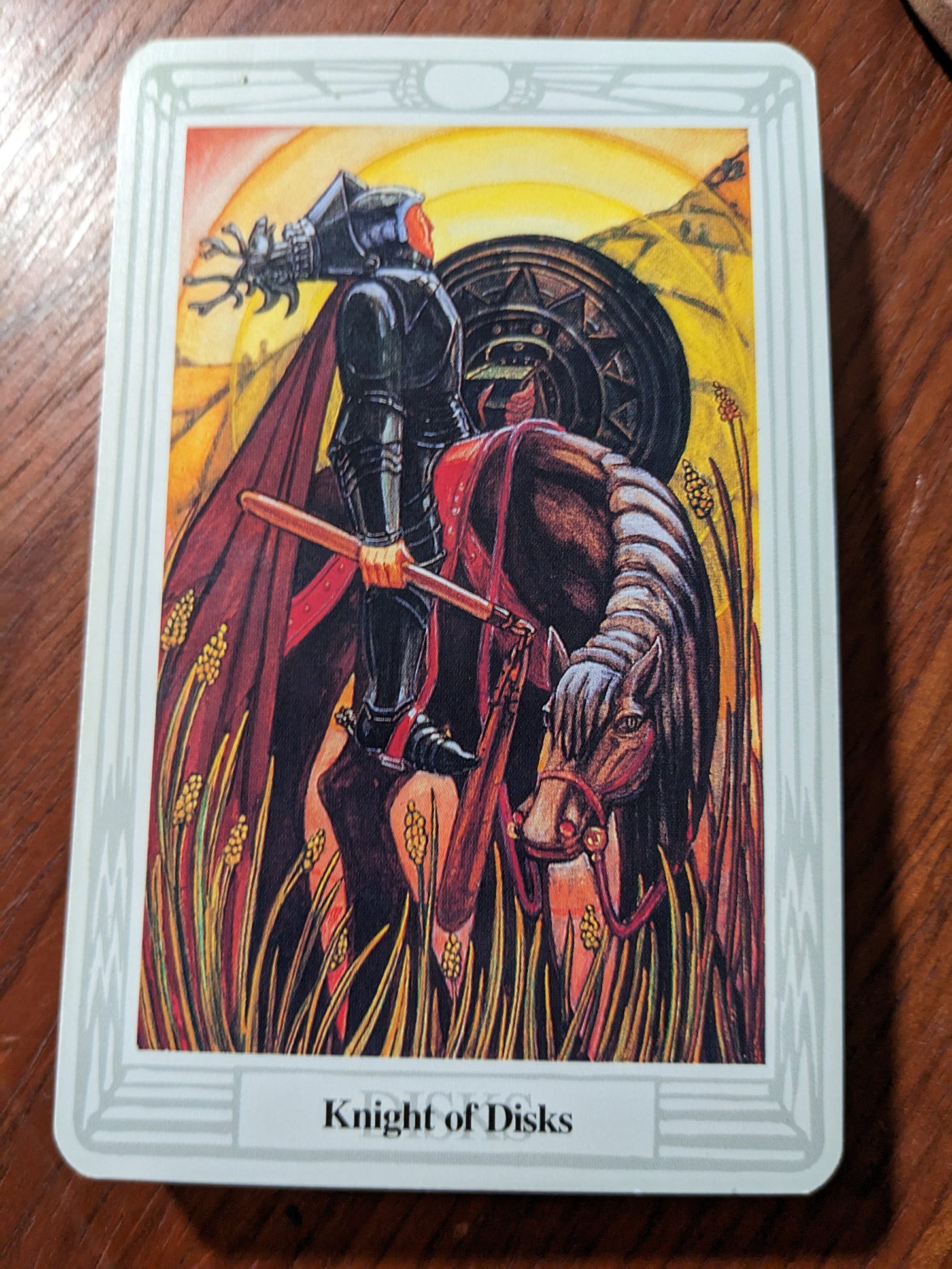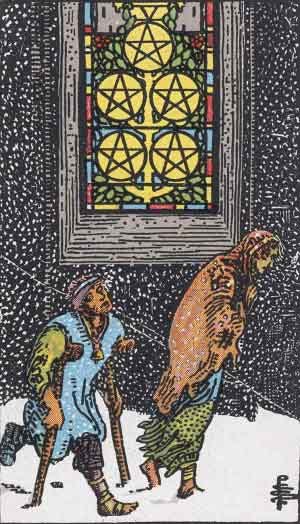Turning Things Around: The Inner Tarot Revolution Week 13
Gestation, Germination, Growth, and the Underworld Journey
Poverty consciousness sucks. I was dealt a particularly awkward hand in this regard because my father never had a problem providing for the family; that was never the issue. My issue, once my mother left us, was that he worked too much. After the house I was born into in Arvada, CO, the next two homes we owned—in Westminster, CO, and then Davis, CA—were newly-built in subdivisions filled with other versions of the same 5 houses, all of them just as new. That part of my upbringing was extremely privileged, and I was educated about the fact. My father’s work was important, scientifically esoteric stuff that often involved high-level clearances and, near the end of his career, involved his voluntarily serving repeatedly on the panel for the Baldridge Awards, something most people can only stomach doing once, for the Bozo badge. He did it for the enjoyment he got out of it, several times.
Once I was sent to live with my mother, it was a different story. Fortunately for her, she’d worked the entire time she was with my father, which put her in good stead to land on her feet after leaving my father and I. However, her earning power was nothing like my father’s, and her career options were further limited considering she kept getting phone calls at work about my being in the emergency room. So I went from relative privilege to getting in fights over an 89-cent box of Rice-A-Roni because we couldn’t afford for me to eat two in a day, even as I blew up to 280 lbs. from Depakote.
The bottom line is that living on the edge that way—especially when you factor in the extremes, in my case, of drug use and mental health issues, psych hospitalizations, more time spent in rehab than classrooms in high school, dropping out— traumatizes a person and their nervous system in ways that can leave lifelong scars that never fully heal on their own. Put simply, in a capitalist society like the one here in America, the poor end up ironically paying more for basic day-to-day necessities than the people rich enough not to care about shouldering the burden of that difference. It’s sick. And what happens when a person lives in survival mode for that long is that we develop a fundamental distrust in the basic concept of abundance. This often leads to developing relationships with resources, wealth, abundance, and their management that are not healthy or beneficial in the long run. Behaviors get worn down into solid neural ruts that are fully appropriate in circumstances of grinding poverty or even living check-to-check, that don’t serve one very well as soon as they find themselves more “afloat”
financially. People who experience it early enough in life may never learn what options they even have to invest even small sums of money. Never learning to put eggs in more than one basket and never even having enough wealth at one time to consider doing so responsibly, one develops a strange sort of material “shakiness” wherein we don’t even trust the very ground beneath our feet to support us. Even in times of plenty, we simply can’t feel secure enough in our finances to trust them the way one needs to in this world in order to be independent in any real sense…at least, not until we learn to. And for someone who lives in poverty consciousness, the only way to do that is to face down the fear at the core of the unhelpful attitudes.
Compounding such issues, the effects of these traumas—quite measurable in medical terms in things like average cortisol levels—are now known to be passed on generationally at the epigenetic level. In other words, the traumas my mother inherited from her parents, as well as her own, now land on my shoulders. Let me tell you, it’s a strange and wonderful thing to be living at such a time in history as this one, in which my generation has both the benefit of being one of the first to widely understand these things and the burden of being among the first to be obligated by this knowledge—if guided by certain ethical principles, as many of us are—to start changing those patterns.
It’s deep and important work. Anyone doing it is taking a much-needed long view of what we know humanity will be facing in the times to come.
This song just began playing as I was preparing to wrap this intro up and say, “Let’s do cards”:
Top/Sun Card

This week, I feel like addressing one of the core differences between the Thoth tarot and the traditional tarot, since I got all big-mouthed about it in last week’s entry. What’s with the Court Cards?
In traditional Tarot decks, the 16 Court Cards, which are said to often represent specific people in the querent’s life, fall into four ranks (from lowest to highest:) Pages, Knights, Queens, and Kings.
There is an elaborate explanation for the reasons Crowley made these changes, but in his tarot deck, we have instead (again, from lowest to highest): Princesses, Princes, Queens, and Knights. In the Thoth deck, there are no Kings. In other words, the Patriarch doesn’t (typically) just sit on his ass governing a kingdom. He works for it on the frontlines—yes, even in war. The Kings are both more dynamic here, and more directly involved in the success or failure of their Kingdom.
The one exception to this is the Knight of Disks, this week’s Top/Sun card. I find myself in this guy’s position, learning his lessons, in some interesting ways.
This Knight sits stationary, and I didn’t notice this until Lon Milo DuQuette pointed it out in Understanding Aleister Crowley's Thoth Tarot, but he’s also much shorter than other Knights. Bit of a dwarf, really, which would suit his attribution to Disks, the suit of Earth and material resources. He sits in a field of wheat, another earth symbol, holding up a shield that radiates…something out upon still more fields apparently watched over by this Knight. Is he a custodian of these fields? The guardian of these foodstuffs as they gently grow here in the Earth?
According to DuQuette, the typical character associated with this Knight as a person is a hardworking and industrious one, and one that isn’t necessarily that smart. So Earthy, at the cost of so much Air, that they are more likely to scorn intellectual pursuits. Crowley says that his Knight’s function is limited “solely to the production of food,” though we can clearly see he is outfitted for battle should it find him.
Two associations come to mind as I survey this card and one is another thing I’ve been meaning to discuss in one of these tarot posts, and that is my method of working with these cards. I have written some posts here nodding to Frater U.:.D.:., author of High Magic: Theory & Practice, but the way I work with these cards each week is inspired by his thoughts from that book about both sigil magic and “symbol-logic.”
Just as Frater U.:.D.:. advises with regard to sigils, I largely spend my week ignoring these cards. I only engage with them actively on the day I write these posts (typically Wednesday, in honor of Thoth). I pull out DuQuette’s book and any other of the several books I have about the cards and read the corresponding entry that day, and write the entry pretty soon after that.
I flip the top card to the bottom of the corresponding stack, check out the new top card, then set the stacks aside.
Once I’m done writing each week’s post, I store each stack for the week in a separate plastic bag: Green for the Sun Stack and blue for the Shadow Stack. I do not think about them at all during the week if I can help it.
As such, the cards incubate all week in my subconscious mind, and, I find, they do seem to manifest not only in the things that preoccupy my mind throughout the week, but also in some of the things that happen. I am like the Knight of Disks, minding my daily business, as this working proceeds in the background, growing and developing unseen in the fertile soil of my subconscious mind. As I sit calmly and quietly in watch over these fields, I radiate my sturdiness to any who might threaten them.
Top Shadow Card
Some of the cards in the tarot can be interpreted as either positive, negative, or more neutral, with plenty of leeway depending on other circumstances such as other cards surrounding it in a reading. Other cards are overwhelmingly positive or negative. The 5 of Disks is almost always a “Fuck me!” card. The Fives in general are usually unwelcome, all of them being tied to the volatility and destructive nature of the Sephirah of Geburah (“Severity”) Qabbalistically, and this is certainly not something that meshes well with the suit of Disks. The astrological timing of this appearance is noteworthy in that Crowley assigned this card the astrological aspect of Mercury in Taurus. The Sun did just enter Taurus, but we are also about to have an eclipse along the Scorpio/Taurus axis, while Mercury is in retrograde. Right now, the astrological advice would be against me pressing my writing forward, and would instead encourage something more along the lines of the Knight from the Sun Stack. That would provide a solid correspondence with this card’s appearance as a Shadow card: This is the fear, the specter, at the core of my difficulties heeding that advice (aside from the desire I feel to defy the stars oftentimes).
The traditional Colman version of this card shows two people walking in the snow outside of what appears to be a church. One of them uses crutches:
There is a strong sense here of being “left out in the cold.” This is the fear at the core of my own poverty consciousness. Some people live in deep fear of being reduced to this state. It’s important whenever this card comes up to keep in mind that this is all a state of mind, even if you find yourself in a material position not unlike the one depicted above. The people above have hope if we can imagine it. Maybe they’re on their way somewhere better? Maybe that depends on how they face whatever comes as they wander the snow-covered streets?
The point (for me anyway) is that it’s well to be motivated by this fear; it’s a healthy fear we are all biologically programmed to have, after all. However, if we approach that fear in terms of avoidance of hardship, we can inadvertently miss or simply reject opportunities and even obligations that would lead to greater security. It’s about how we respond:
Fight? Flight? Freeze? Fawn?
I can read any of the above into this card.
Which is the most productive in any given situation? That, too, varies.
Where is this pair headed? For that matter, where are they coming from? Looks can be deceiving. This could be a snapshot of two people who do, in fact, have a home.
This is an attitude.
The clock reads 17:17.







